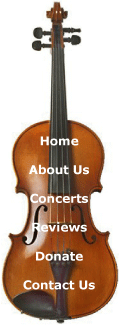

Guest players in String Quartet mesh beautifully
By Travis
Rivers
Correspondent
The
Spokesman-Review
Oct. 9, 2006
The Spokane String
Quartet began its 2006-07 season Sunday at The Met with a whole new violin
section. "So, that is only two people," you
say. Still it is half the players, a cause of much concern to chamber
music audiences.
There was no need for worry. It was apparent from the first sounds
of Mozart's youthful String Quartet in F major that the new players – violinists
Julie Ayer and Misha Rosenker (replacing Kelly Farris and Tana Bland) – meshed
excellently with quartet regulars violist Jeannette Wee-Yang and cellist
Helen Byrne. And the remainder of the program found all four well attuned
to one another, both technically and musically.
Audiences rarely get a chance to hear Mozart's early quartets, and they
are charmers. The work played Sunday was written when Mozart was only
16 in Milan, where the composer was on a concert tour. The quartet has
the easy-going songful flavor of one of those Italian serenatas or divertimentos
that Italian composers turned out by the dozens.
The ensemble Sunday brought both precision and naturalness to Mozart's
transparent little masterpiece. The work is dominated by the first violin
part, which takes a prima donna role in a work conspicuously operatic.
(What work of Mozart's isn't?) Ayer, like any good prima donna, knew
exactly when to push and when to hold back. She and the other players
lent vitality to the work, providing nudging accents, subtly gauged dynamics,
and a dance-like rhythmic flexibility at the ends of sections and movements.
Hugo Wolf's "Italian Serenade" gave an exuberant ending to
the concert's first half. Wolf is known for his many songs for solo voice
and piano. He wanted very much to write large-scale instrumental music,
but his heart lay with the song. The "Italian Serenade" was
a delight in its Mendelssohnian lightness and speed. The quartet players
brought the same transparency to Wolf as they had to Mozart, plus the
right measure of late romantic intensity to give a bite to Wolf's textural
and harmonic quirks.
The big work of the afternoon was Brahms' String Quartet in A minor,
a work of symphonic scope and the bittersweet melancholy that is typical
of Brahms. This work demands warmth of tone and careful balance among
all four parts. No dominant prima donnas here. When Brahms passed skittery
staccato passages from one player to the next in the third movement,
these four sounded like a single player performing on one supersized
instrument.
I particularly admired the genial exchanges between pairs of players
in this work and was especially struck by Ayer and Wee-Yang's duet at
the beginning of the slow movement.
Farris is taking a well-deserved year's leave of absence from the
quartet, and Bland a shorter maternity leave. But they left the
Spokane String
Quartet in eight very capable hands Sunday afternoon. And the remainder
of the season, with a new guest first violinist for each concert, promises
similar happy musical surprises from the group.
[Home] [About Us] [Concerts] [Reviews] [Donate] [Contact Us]
Spokane
Chamber Music Association
P.O. Box 3741
Spokane, WA 99220-3741